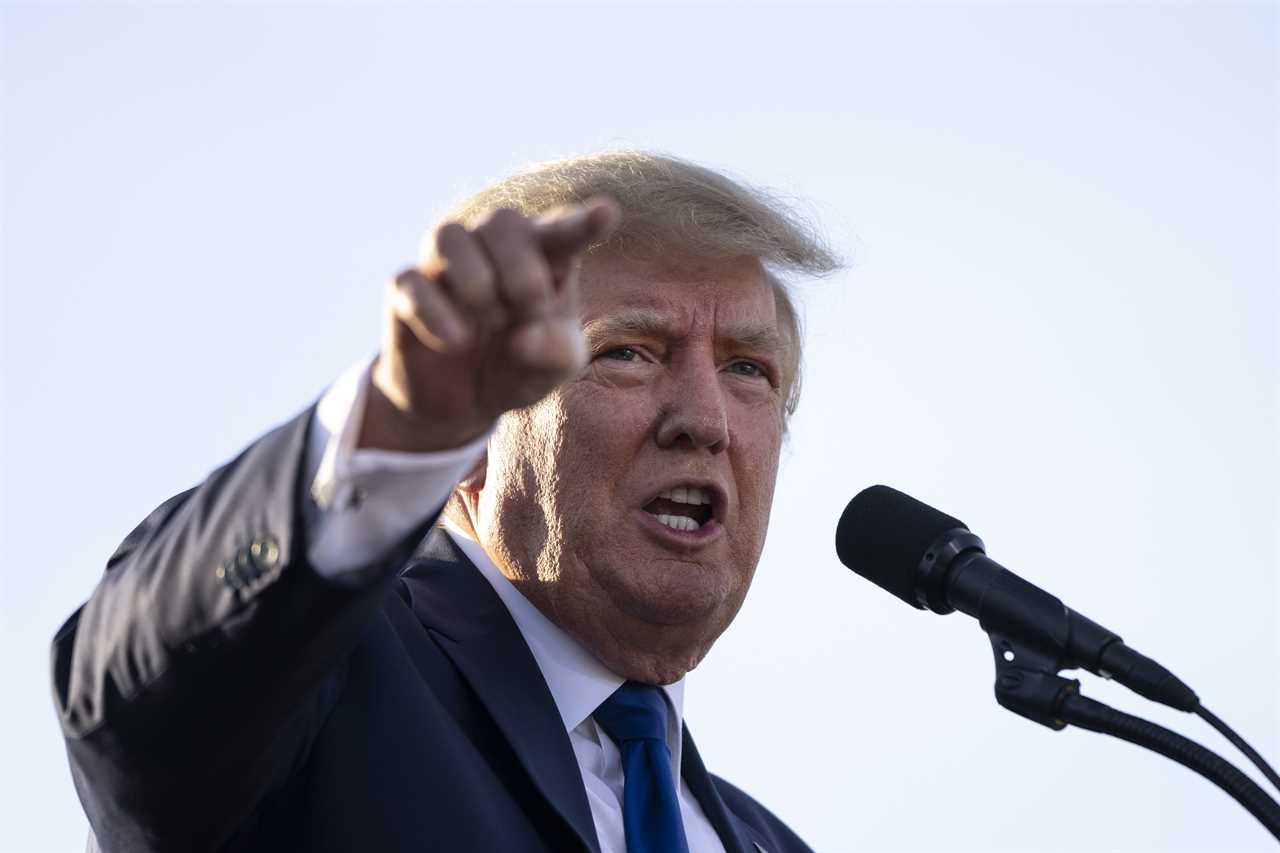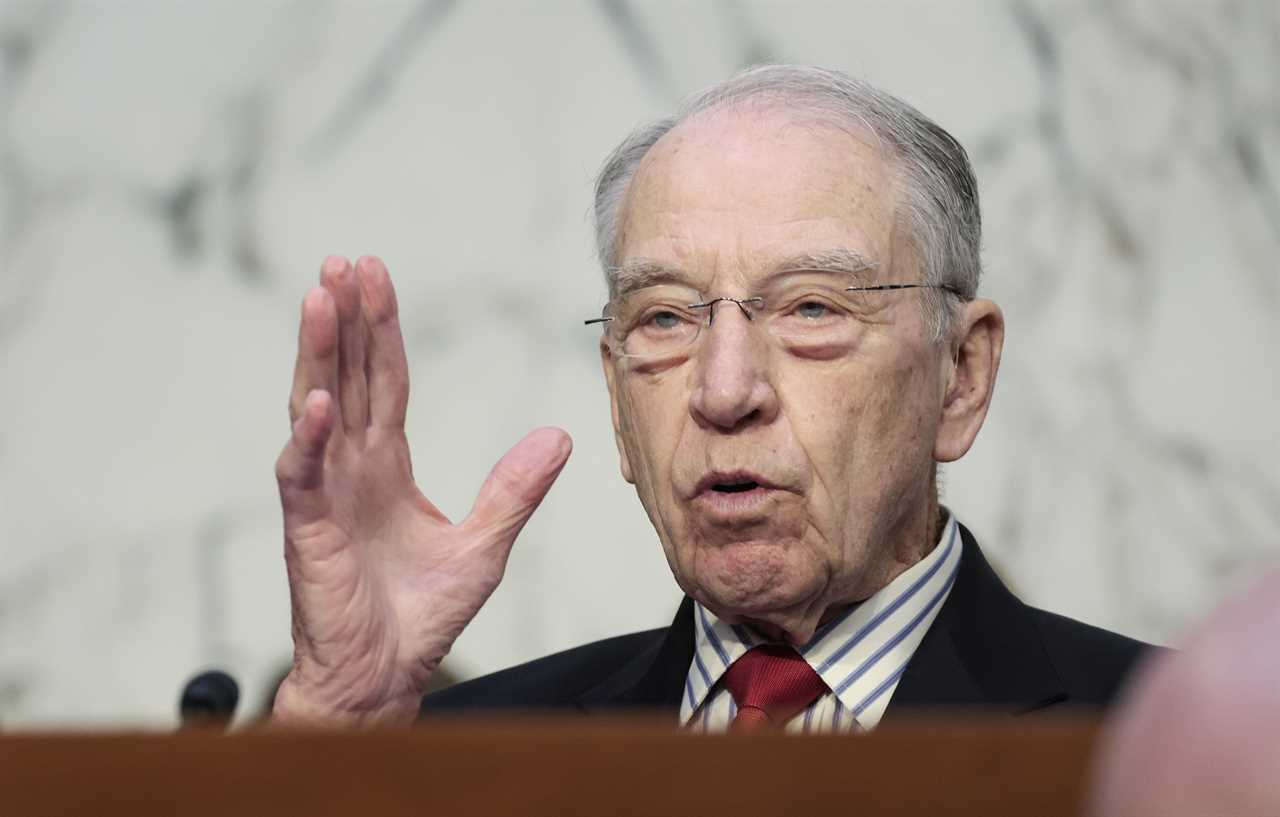
When Donald Trump signed a long-sought criminal justice reform measure into law in 2018, he had visions of using the legislation to make major inroads with Black and moderate swing voters.
The First Step Act was not just hailed as a rare bipartisan achievement for the 45th president but as the beginning of a major shift in GOP politics, one that would move the party past the 1980s tough-on-crime mindset to a focus on rehabilitation, racial fairness and second chances.
Three-and-a-half years later, few Republicans — Trump included — seem not at all interested in talking about it.
With spikes in crime registering as a top concern for voters, Republicans have increasingly reverted back to that 1980s mindset. Talk of additional legislation has taken a back seat to calls for enhanced policing and accusations that Democratic-led cities are veering toward lawlessness.
Trump himself rarely, if ever, mentions criminal justice reform when he issues statements or gives political speeches, having grown convinced the First Step Act never produced the spike in support from Black voters that he expected.
On Capitol Hill, Republicans made stiffer criminal sentencing a main focus during the Supreme Court confirmation hearings for Judge Ketanji Brown Jackson. Discussions of rising crime are a daily focus on Fox News. And out on the campaign trail, GOP candidates are running ads demonizing Democrats for not doing enough to support police.
Sen. Tom Cotton (R-Ark.) recently called the First Step Act — which he opposed — a “deadly mistake.” And in Georgia on Monday night, Republican gubernatorial candidates, former Georgia Sen. David Perdue and Gov. Brian Kemp clashed in a debate over who and what is to blame for rising crime in the state.
“The focus has changed because the situation has changed. We’re not the same country,” said Republican pollster Frank Luntz.
For some advocates, the Republican Party’s cooling to criminal justice reform confirms the belief the interest wasn’t ever sincere. But for lawmakers and advocates on the right who worked on the First Step Act, the shift has been similarly disconcerting, raising concern it freezes political momentum for further reform.
“I personally think there's just as many people that want to do criminal justice reform as the last several years, but I think their voices are quiet now, and those that are opposed to the First Step Act are still opposed and have gotten louder,” said Brett Tolman from the conservative group Right on Crime. Tolman added that much work continues behind the scenes. “It feels like we just have to bide our time a bit and get past when the emotion of all of the political rhetoric is at the forefront.”
While it didn’t go as far as advocates hoped, the First Step Act was widely regarded as a significant overhaul of the criminal justice system. The law aimed to shorten sentences for nonviolent drug offenders and improve incarceration conditions at the federal level, and sought to address racial inequalities in the justice system.
While he had branded himself as a tough-on-crime Republican, getting Trump on board wasn’t simple. Then-Senate Judiciary Chair Chuck Grassley (R-Iowa) and Trump’s son-in-law, Jared Kushner, labored to convince him that embracing criminal justice reform wouldn’t tarnish his image — and could even be a political boon. The support of influential conservatives, and celebrities like Kim Kardashian, further convinced Trump the move would win over certain demographics.

Early on, Trump was proud of his work on the issue, according to people close to him. He bragged about the First Step Act, hosted a prison reform summit at the White House and even aired a Super Bowl ad featuring Alice Johnson, a Black woman and first-time drug offender whose life sentence he pardoned in 2018.
But he later snubbed it on the campaign trail, choosing instead to attack Democrats over calls to defund the police. His skepticism became more pronounced after a summer of protests and violence following the murder of George Floyd while in police custody.
“President Trump was always skeptical that it was the right policy and that it would be received well by voters, and he has remarked to almost anyone who’d listen that it was something Jared talked him into,” said one former Trump official. “There’s always a certain push and pull with President Trump between being the hardliner and the deal-maker and this is a classic example of where that conflict emerged in the policy sense.”
Those who worked on the issue with the Trump administration tried to defend the act from the fire it now faces from certain quarters. Pastor Darrell Scott, a Trump ally who talked regularly with administration officials, said he understood why Republicans seemed to be running away from criminal justice reform.
“There’s a lot of polarization there and with this being an election year, [Republicans] are treading carefully on what they want to comment on and what they want to be silent on,” Scott said.
Republicans who support reforms say the party can be both in line with that vision and adopt a tough-on-crime posture — that voters will be able to differentiate between crackdowns on violent crime and accountability in the justice system.
“Reform and calling out truths can coexist. It’s not a binary decision. And there are achievable solutions available,” said Zack Roday, a Republican political strategist.
But trends aren’t helping the reformer’s cause. In the past year, violent crime rates have risen dramatically, with at least 12 major U.S. cities breaking annual homicide records in 2021. Recent polling reflects public concerns about rising crime rates and dissatisfaction with how public leaders are addressing the problem. Republicans pointed to the trends as evidence of a Democratic failure.
“After blocking common sense police reform, enacting soft-on-crime policies, and cheering to defund the police, [President Joe] Biden and Democrats’ words and actions have come to fruition as American cities face record surges in crime,” said Republican National Committee spokesperson Emma Vaughn. “Democrats may be too out of touch surrounded by private security to know the reality of rising crime, but for Americans the consequences of their policies are very real.”
Republicans aren’t alone in tightening their messaging. In major Democrat-led cities like San Francisco, Chicago and Washington, D.C., leaders are calling for more, not less, police funding. Biden, who ran in 2020 on increasing police budgets, has continued pushing for more money, even calling on states to use Covid-19 aid to hire more law enforcement officers.
While Biden has not backed away from criminal justice reform, he has struggled to implement it. His administration unveiled pardons for three people and clemency plans for 75 inmates this week, including $145 million for reentry and job training plans for formerly incarcerated people. But a police reform bill stalled in the Senate, and advocates say Biden has fallen far short of his campaign promises to enact significant changes.
Despite the changing political winds, reform advocates still say they are optimistic that Congress will pass the EQUAL Act, which would end federal sentencing disparities between crack and cocaine offenses. Supporters of the bill, which the House passed in September with the support of some of the most conservative members, say it would address racial disparities, noting 90 percent of those serving federal time for crack offenses are Black.
“Support for the EQUAL Act is very consistent with the support of tough policies and fighting violent crime,” said Republican Arkansas Gov. Asa Hutchinson, who served as Drug Enforcement Agency administrator under then-President George W. Bush and has personally encouraged Republican senators to sign onto the bill. “There's nothing inconsistent there, this is one thing that will build confidence. If you embed unfairness in our system, you will undermine it, and the EQUAL Act is designed to create that fairness and that’s the foundation for juries coming back with fair sentencing and results.”
So far, the bill has the support of 11 Republican senators, the National District Attorneys Association, the Major Cities Chiefs Association and the American Civil Liberties Union. But congressional aides warn the legislation is not a slam dunk, especially without the support of Grassley, now the top Republican on the Judiciary Committee. This week, the senator introduced a separate bill tackling crack and cocaine sentencing disparities. And in a midterm election year when public focus is on rising crime in communities, some conservatives say they do not see a path forward for federal reforms.
“From the federal government I don’t see anything passing this year on criminal justice reform, I think they’re done. I think the politics of it are too difficult,” said Charles Stimson, a crime expert at the conservative Heritage Foundation. “People will probably be motivated in the fall to vote for folks who take the law and order approach and they’re not going to believe people who say they don’t have a crime problem.”
----------------------------------------
By: Meridith McGraw
Title: Trumpworld thought criminal justice reform could win him the Black vote. Now, they don’t talk about it.
Sourced From: www.politico.com/news/2022/05/01/trump-republicans-first-step-act-00029104
Published Date: Sun, 01 May 2022 06:00:00 EST






